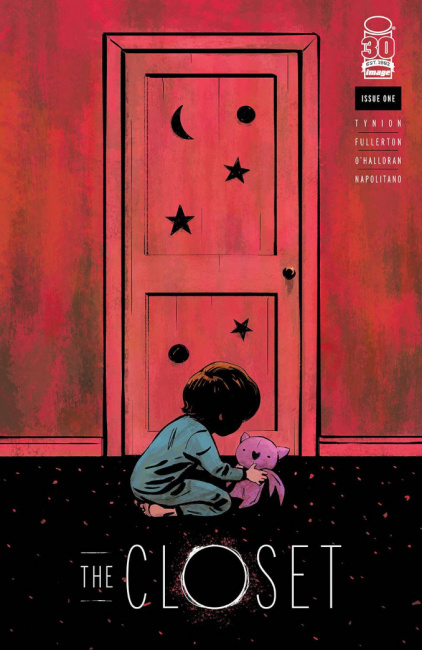Spring is here and the comics industry is starting to bloom with news and events. Here are a few stories that caught my eye the last few weeks.
Read the Room, Red Room. Last week, Ed Piskor’s gruesome indie project Red Room (Fantagraphics Books) released previews for variant covers of the next issue of its current series, Red Room Trigger Warnings. One of the artists, Piskor’s collaborator on the Comics Kayfabe podcast, Jim Rugg, has been doing homages to 1980s classics as his shtick, and this time he decided to do a version of Art Spiegelman’s landmark Holocaust memoir Maus. Because what better way to promote your pal’s terminally cynical snuff porn “outlaw comics” pastiche than to do a piss-take on one of comics’ most somber reflections on genocide and expatriation just at the moment when Russian tanks are rolling across the ancestral killing fields of the actual Holocaust and driving millions of refugees into Europe?
Now in fairness, the atrocious timing wasn’t entirely their fault. The Maus cover was probably meant to capitalize on the controversy around a Tennessee school board striking the Pulitzer Prize-winning work from the middle school curriculum (see “Of Maus and Men: Comics, Censorship, and What We Can Do About It“). See, if you’re offended by something like that, just wait till you get a load of Red Room, amirite?
Problem is, Rugg, Piskor and Fantagraphics discovered there really is no good time to satirize a Holocaust memoir to promote a snuff-porn comic; only bad times and the very worst time. Reaction was swift, as you might imagine. Rugg apologized, and by nightfall, Fantagraphics posted the following announcement:
Fantagraphics, Ed Piskor, and Jim Rugg have decided to not publish the variant cover for Red Room: Trigger Warnings #3 that referenced the comic Maus.
Jim Rugg states, “I am sorry for my latest Red Room cover. I have drawn several variant covers for the Red Room series and I had fun parodying famous and iconic comics and graphic novel covers, but I realize (now) that the morally charged subject matter of Maus made it an inappropriate subject for the necessarily over-the-top Red Room treatment and I apologize for my misjudgment. I did not consider how this would affect people. I never meant to hurt anyone. I’m sorry I hurt you. I was ignorant and insensitive. I take responsibility. I offer no excuses. I was wrong. And I am sorry, Mr. Spiegelman and everyone this has hurt.”
Fantagraphics supports the artist’s decision to pull this cover and we regret that we did not bring this issue up during the editorial process. We wish to offer our own apology for its offense and we are sorry for our part in this. Going forward, we will be more cognizant of our comics covers.
As damage control goes, that’s a 10 out of 10 in terms of taking responsibility and not putting the blame on those who were offended. Definitely a superior response to “eat shit, snowflake!” which, unfortunately, is also a move on the board for people stuck in this position.
My personal reaction to this situation is disappointment. First in Piskor and Rugg, who are talented creators and thoughtful critics of comics history, although I am emphatically not a fan of Red Room. I guess, given the comic, it wasn’t a great bet to overestimate their tastefulness and sensitivity. This was also a misstep for Fantagraphics, which, despite its oft-expressed bratty streak, should have known better. They’re a little old to have to learn this the hard way.
But finally, I’m disappointed in the times we live in. I honestly think no work should be on a pedestal where it is immune from all parody and criticism, not even Maus. When we start making work sacrosanct and instinctively break out the pitchforks at the slightest offense, even out of the best intentions, we move a little bit closer to the world that Maus warns us about. Creators who push boundaries are entitled to free speech even when they cross the line of good taste, just as we’re entitled to speak freely about their work and their choices. The problem is, because of the timing and the cheapness of this particular move, it’s not even a close call, and Fantagraphics’ abject apology feels much more on point than any appeals to higher principles.
From Substack to the comic rack. Digital subscription platform Substack has been making waves by throwing enormous piles of money at A-list comics creators (see “Comics on Substack Makes Sense in Every Way Except One“). While this was a windfall for those creators, and a boon for fans in terms of getting new material from their favorites, it didn’t strike me as a win for the medium or the business of comics, especially retail. After all, every hour James Tynion IV and Scott Snyder spent making comics for digital-only formats is one less hour they’re spending making comics that bring fans into the store. Also, I am not a fan of getting comics a few pages at a time in my email inbox.
Substack looks like it’s starting to address a couple of those concerns. Last week they announced they were launching a mobile app to bring the experience of reading their subscribed content closer to 2015 than 1999. It’s not yet clear how the app works for comics, other than just displaying them using a third-party .cbr/.pdf reader. But hey, progress!
The bigger story is that the work created for Substack is starting to find its way onto the bookshelf. Tynion and artist Gavin Fullerton’s horror series The Closet is getting a dead-tree release from Image Comics in June (see “Image to Publish Tynion and Fuller’s ‘The Closet’), with others almost certain to follow. That move amplifies Substack’s value to creators, who can double dip in multiple formats; to fans, who can enjoy the work in a different context and have something to add to their collection; and to retailers, who get a slice of the pie, even if it’s leftovers. Does it devalue the exclusivity that Substack is paying so much for? Seems unlikely, given what we know about digital and print audiences being pretty distinct.
A pioneer moves on. And how do we know that about digital and print audiences? Largely due to the experience of groundbreaking digital comics app comiXology, which came out of nowhere to turn the business upside down in the early 2010s then got gobbled up by Amazon in 2014.
The industry may not see it this way, but we got very lucky that comiXology emerged victorious from the digital comics wars. From the get-go, cX was done for comics fans by comics fans, and has done a lot for comics in terms of expanding the market, being a major presence and sponsor of events, and fostering new talent. A lot of that comes down to cX co-founder, CEO and Amazon global head of digital comics David Steinberger, who announced his departure from the company recently (see “ComiXology CEO Steniberger Out and Up at Amazon“).
ComiXology, as we know, has had its ups and downs, including the unfortunate technical issues related to its integration with Amazon Kindle. But I think it’s fair to say that comiXology’s biggest problems happened in spite of Steinberger’s presence (or at least were the result of things outside his control), whereas most of their smart moves, from comiXology Unlimited to Originals to expanding the catalog of manga and European comics, were done with his enthusiastic support. And each step of the way, he did what he could to protect the interests of creators, readers and even retailers.
It’s hard to think of many other people who have had as big an impact on the 21st century comics business as David Steinberger, even if his vision for digital comics remains a work-in-progress. It’s sad news for us that he’s moving on, but hopefully good news for him and whatever project will benefit from his passion, insight and business sense.
The opinions expressed in this column are solely those of the writer(s), and do not necessarily reflect the views of the editorial staff of ICv2.com.
Rob Salkowitz (@robsalk) is the author of Comic-Con and the Business of Pop Culture.
Source: ICV2







